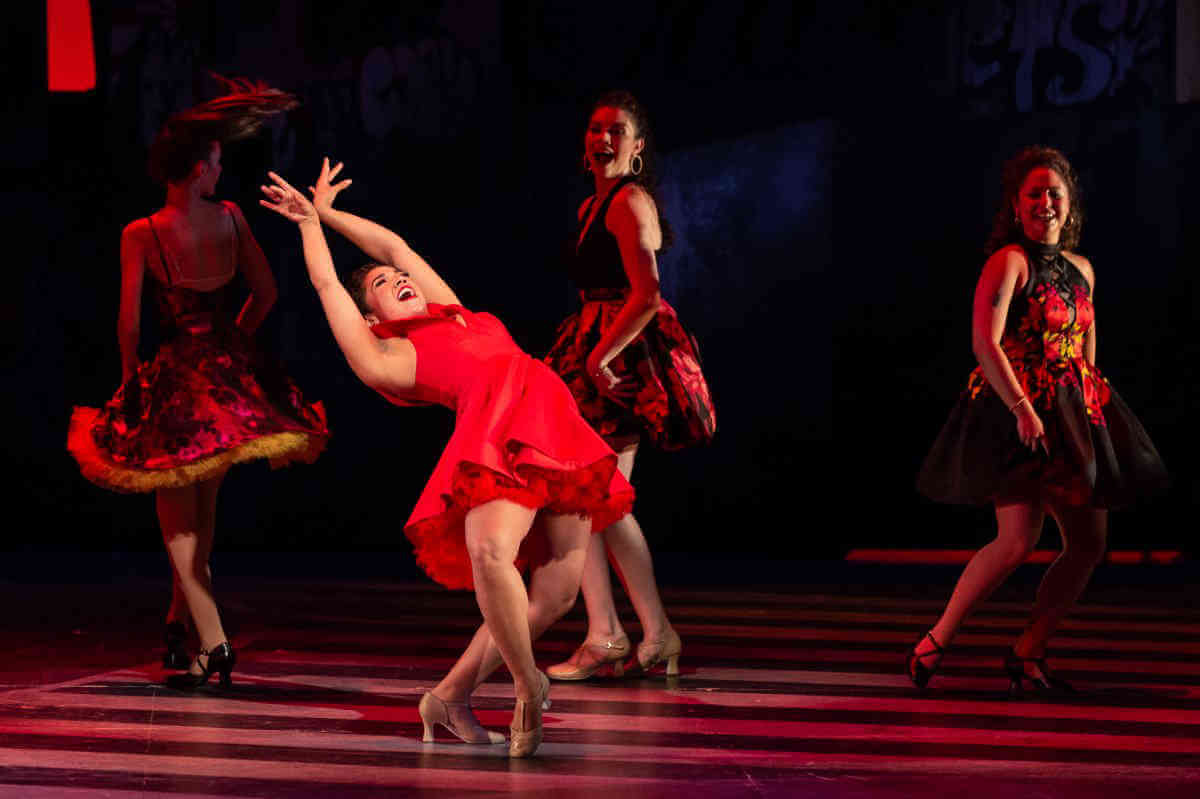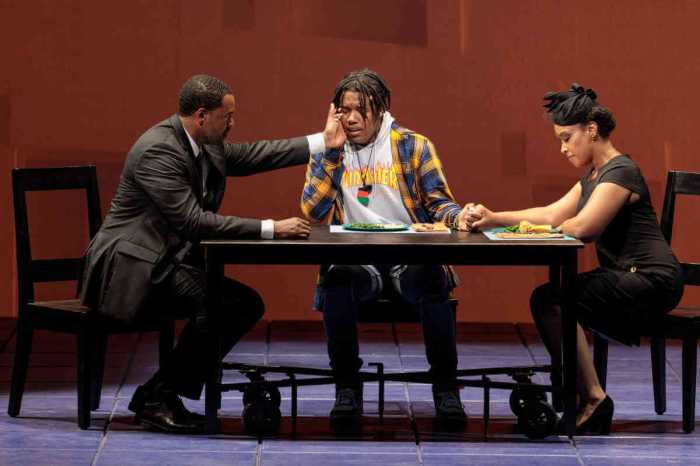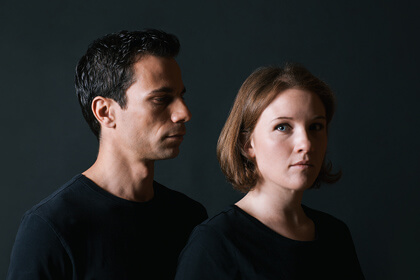Glimmerglass presents two American works this summer: the Pulitzer Prize-winning “Silent Night” by Kevin Puts (libretto by the justly busy Mark Campbell) and centenarian Leonard Bernstein’s “West Side Story.” I had seen and enjoyed the Puts/ Campbell piece before — moving but not mawkish in portraying World War I’s unofficial “Christmas Truce.” We have three groups of soldiers depicted — Scottish, German, and French — with some backstories and personal dramas given, including class tensions, family ties, and (oddly, when one thinks of it) only two love stories, both straight, one French and one German. What binds the warring troops together peacefully for a while are two things that the Betsy deVoses of the world have cut from our schools: music and languages. They’re united in the dashing form of Sprink, a noted tenor in the German army. His bravery and humanism transform the difficult situation in the trenches.
Sprink’s character is supposed to be an established opera star, not a young novice, so I regret that the company didn’t call upon William Burden, who sang the role wonderfully in Minnesota and Philadelphia. Young tenor Arnold Livingston Geis coped pretty well in a testing part that suggests the contours and colors of Burden’s voice and requires his linguistic proficiency. As his diva girlfriend, promisingly powerful soprano Mary Evelyn Hangley acted well but sang flat at the top until well into the evening.
The three baritone lieutenants — Jonathan Bryan the Scot, Michael Hewitt the German, and Michael Miller the Frenchman — all sang and acted well, as did tenor Christian Sanders as the bitter Jonathan Dale and baritone Conor McDonald in a charming turn as the barber Ponchel. Brian Wallin (German General) coped manfully with cruelly Straussian tenor writing.
Tomer Zvulun staged the piece in telling strokes, balancing the comic and “human interest” moments with the darker tragedy and fully utilizing a clever three-level set by Erhard Rom. As ever, Robert Wierzel lit with distinction. Victoria (Vita) Tzykun’s costumes looked very good but left too many officers resembling one another. Joe Isenberg staged plausible fights. The composer, who was present, and cast were lucky to have Nicole Paiement in utter command in the pit. “Silent Night” is a worthwhile and moving experience in the theater.
General director Francesca Zambello brought in an enjoyable, show-bizzy “West Side Story.” Certainly, this 1957 creation by four amazingly gifted gay men (Leonard Bernstein, Stephen Sondheim, Jerome Robbins, and Arthur Laurents) belongs in the company’s musical series, and (heard July 16) David Charles Abell conducted with aplomb.
Admirably, Brian Vu’s Riff was able to keep up with the more highly trained dancers among the Jets, and he voiced his music with good tone and an elegance rare in this macho part. But his speech (educated Los Angeleno) was as unconvincing as Joseph Leppek’s Midwestern Boy Scoutishness. Granted, most every Tony since the late lamented Larry Kert created the part have come off verbally as something far from the recently reformed street brawler Tony should be. Leppek deployed too-much Ben Platt-style tremolo in his singing and tended to one mezzoforte dynamic save for a few falsetto effects; surely a wide palette is needed.
In her third Glimmerglass role, Vanessa Becerra contributed a likable, credibly acted, and notably well-sung Maria. Contrary to tradition, she sang the anthemic “Somewhere” — and did it very well. Her very best singing came where Marias’ pitch often falters, with the tricky “I Have A Love.” Becerra’s excellence in the duet “A Boy Like That” underlined that Amanda Castro, an electric Anita of riveting presence and a superb dancer, lacked volume for the heavily scored moments (though Abell responded considerately). Still, when Castro was onstage everyone else kind of receded. But Tesia Kwarteng (Rosalia) and Brennan Martinez (Consuelo) furnished fine, spirited singing in their scenes with Becerra’s Maria.
Aided more evenly than the “Silent Night” cast by Kathryn LaBouff’s diction coaching, the whole ensemble performed well, if — inevitably — without much genuine sense of period or class tension. Hence we got pathos and laughs, but little danger. Only the persistent “mainland” denigration of Puerto Ricans seemed sadly timely.
Zambello’s direction and Anju Cloud’s energy underlined gender-fluid Anybodys’ heroism and insight — she’s often the only one who knows what’s happening. Michael Hewitt made Diesel as imposing vocally as physically. Olivia Barbieri (Teresita), Rachel Kay (Graziella), and Joanna Latini (Velma) also showcased dancing chops. Perhaps too charismatic for his role, Schyler Vargas made more of Chino then one usually gets. Zachary Owen, with a fine speaking voice, was duly nasty as Lieutenant Schrank. Not for the first time at Glimmerglass, we got gay minstrelsy that had the baseball crowd chortling — this via the character of Gladhand.
Julio Monge reproduced some of the original Jerome Robbins choreography that set “West Side” apart; but the Cooperstown stage proved too small to allow its full impact.
Zambello likes — and as a director, copes unusually well with — epics like the “Ring” and “War and Peace.” Next year brings “Show Boat” and the — to me — cloying, politically retrograde “Ghosts of Versailles.” What about Glimmerglass finally doing “L’Elisir d’Amore” or “L’amico Fritz?” Or — as I heard several people saying at intermission — bringing back the Baroque works that helped put the festival on the map? “West Side” is effectively sold out, but one can try for returns; “Silent Night” continues through August 23; the bill also includes “Cunning Little Vixen” with Eric Owens plus Joshua Hopkins as Rossini’s lively Barber.
Martina Arroyo’s “Prelude to Performance” series, presenting very young singers well coached by established professionals in staged performances, has become an established operatic highlight every July at Hunter’s Danny Kaye Playhouse. This year, due to limited funds, the troupe staged just one show apiece of two of the (very) few great operatic comedies, “Don Pasquale” and “Falstaff.” I could only attend the Verdi (July 13) and was very glad I did so. Thanks to Ian Campbell’s sensibly straightforward production — spare, save for handsome traditional costumes by Charles R. Caine — nothing encumbered our enjoyment of the quicksilver score. Replacing ailing music director Willie Anthony Waters on fairly short notice, the experienced Richard Cordova led a secure, buoyant account. The work’s tricky vocal ensembles never faltered.
Manhattan School of Music grad José Luis Maldonado, a born Falstaff, enjoyed a personal triumph, singing in a resonant tone with fine legato, trumpeting high notes and unleashing comic oomph. The beautiful Alice, Nina Mutalifu, unveiled a pearly, career-worthy lyric soprano one size less expansive than this particular part demands. Gerardo de la Torre wisely didn’t force his smooth lyric baritone as Ford. Maria Brea’s gracious presence and upper register made her Nannetta pleasant company. The Fenton, Huang Te Yu, had jumped in as cover; he projected best at the top and managed to keep his place, no easy feat. Molly Burke (Meg) showed a delightful comic persona and a strong, solid mezzo. Emily Skilling (Quickly), not free of the shtick character mezzos seem to channel from birth, won laughs and phrased musically but sounded vocally more apt for Handel or Mendelssohn. Kyu Young Lee’s incisive Dr. Caius and Christopher Nazarian’s mordant-sounding Pistola also impressed.
One left admiring these fine young talents but wishing this accomplished “Falstaff” wasn’t just a one-off occasion.
David Shengold (shengold@yahoo.com) writes about opera for many venues.



































